Text messages are a primary way we communicate in today’s fast-paced digital world. While texting is convenient and efficient, it can also make it easier for people to hide the truth behind carefully crafted messages. Whether it’s a friend, partner, or coworker, spotting deception in text can be challenging. However, certain red flags can help you determine when someone might not be entirely honest. In this guide, we’ll explore six clear signs that someone is lying to you in a text, explain why these behaviors occur, and provide expert tips on how to better decode these subtle cues. If you’re looking to improve your communication and protect yourself from deception, read on to discover how to catch texting lies.
They Are Trying To Change The Subject
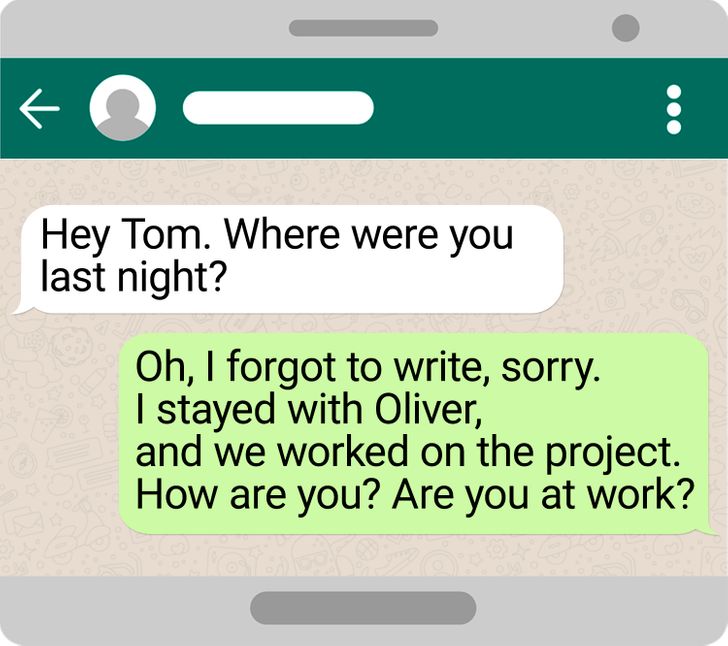
One of the most common signs that someone might be hiding the truth in a text conversation is when they abruptly change the subject. This tactic can be a defense mechanism to avoid answering direct questions or to steer the conversation away from uncomfortable topics.
Why It Happens:
Avoiding Direct Answers:
When a person is being dishonest, they may feel cornered by direct questions. Changing the subject allows them to evade providing clear, direct answers.
Distraction Technique:
Shifting the conversation to a different topic can distract you from the inconsistency or vagueness in their previous messages. This redirection is a subtle way to keep you from digging deeper.
Psychological Deflection:
This behavior might also be an unconscious effort to deflect your attention from any potential contradictions in their story.
Practical Tip:
If you notice someone constantly changing the subject when you ask specific questions, consider gently steering the conversation back to your original query. Maintaining focus can often force them to provide the details they’re trying to hide.
For more insights into communication strategies, Psychology Today offers a deeper look at how people deflect difficult questions.
They Compliment You After Giving You A Quick Answer
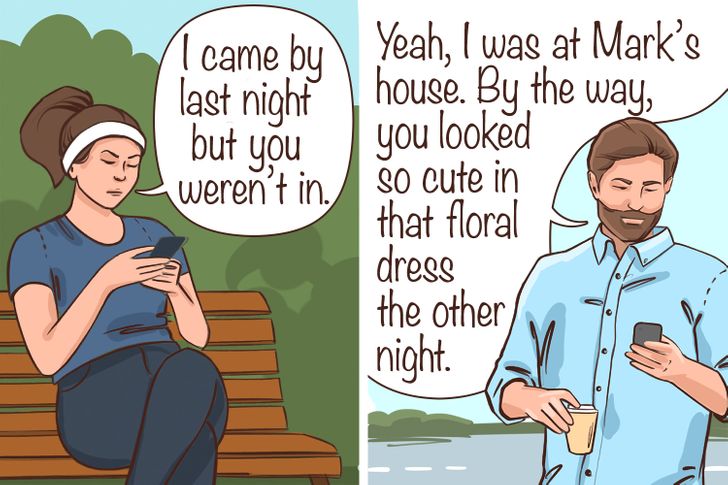
Have you ever noticed that after a brief, vague response, someone quickly follows up with a compliment? This might seem like a kind gesture, but it can be a subtle red flag indicating dishonesty in texts.
Why It Happens:
Overcompensation:
A sudden compliment might be used as a smokescreen to cover up an incomplete answer. By offering praise, the liar hopes to distract you from the lack of substance in their response.
Emotional Manipulation:
Compliments can lower your guard, making you more likely to overlook inconsistencies or evasive behavior in their messaging.
Establishing Trust Quickly:
Compliments are often used to build rapport rapidly. While genuine compliments build healthy connections, when used in conjunction with brief answers, they can be a tactic to steer the conversation away from probing questions.
Practical Tip:
Pay attention to the flow of the conversation. If compliments consistently follow quick, non-specific responses, consider asking follow-up questions to see if they can provide more detailed answers.
For expert advice on recognizing manipulative behaviors in communication, Inc.com has useful articles on effective communication and identifying red flags.
They’re Being Vague
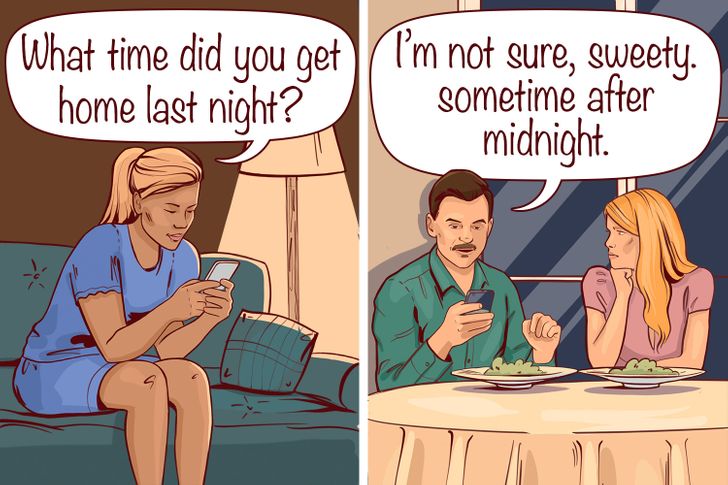
Vagueness is a classic indicator of deception. When someone avoids specifics or gives ambiguous answers, it might be because they’re trying to hide the truth.
Key Characteristics:
Lack of Detail:
Vague responses often lack concrete details, such as times, dates, or locations. This absence of specificity can be a tactic to avoid being pinned down by facts.
Generalizations:
Instead of providing clear information, the person may use broad statements that can apply to many scenarios, thus avoiding commitment to a particular story.
Avoidance of Follow-Up:
When you ask for more details, they may offer minimal information or change the subject, further reinforcing their vagueness.
Practical Tip:
If you receive vague answers, try asking open-ended questions that require more specific responses. For instance, instead of asking, “Did you go out last night?” ask, “What time did you get home last night, and where did you go?”
For more guidance on how to detect vagueness in communication, Forbes offers articles on improving communication skills and recognizing when someone is withholding information.
They Claim That They’re Honest And That They “never Lie.”
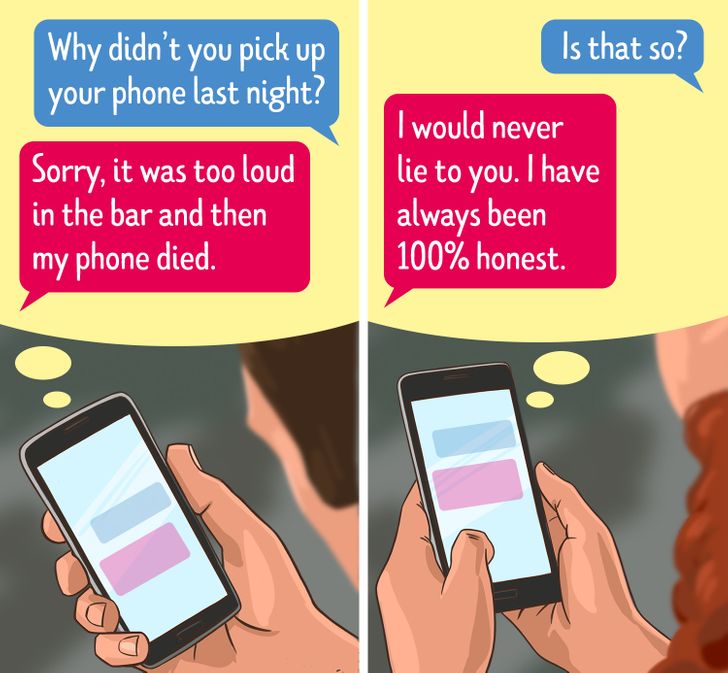
Ironically, when someone makes a point of emphasizing their honesty—especially in texts—they might be overcompensating to hide the truth. Such declarations can often be a red flag for deception.
Why This Occurs:
Defensive Assertions:
By asserting that they “never lie,” the individual might be trying too hard to convince you (and themselves) of their integrity. This overemphasis can be a sign that they feel insecure about the veracity of their statements.
Psychological Projection:
Sometimes, individuals project their own behavior onto others. By insisting on their honesty, they may be unconsciously signaling that they know they’re not being completely truthful.
Lack of Evidence:
Genuine honesty typically speaks for itself. When someone feels the need to repeatedly affirm their honesty, it can come off as an attempt to distract from inconsistencies in their story.
Practical Tip:
Listen for repeated assurances of honesty, especially if they seem to be a recurring theme in your conversations. Instead of taking these statements at face value, focus on the content and details of their messages.
For further reading on the psychology of deception, Psychology Today offers insightful articles on how to spot dishonesty in everyday interactions.
They Create Complex And Extremely Detailed Stories
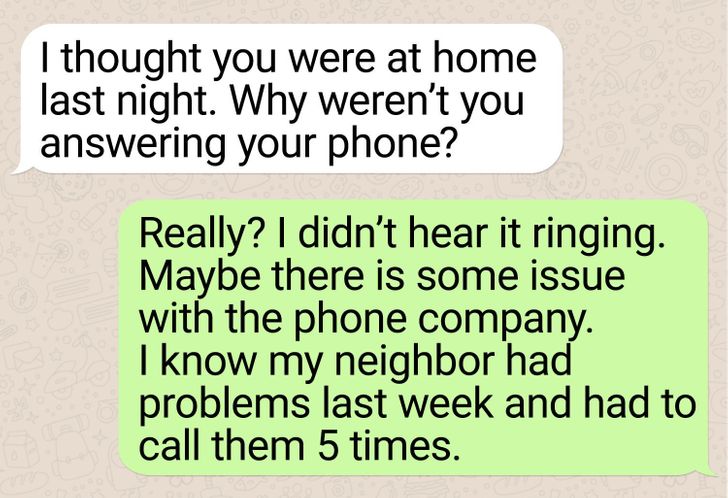
When someone fabricates a story, they often include excessive details in an attempt to appear credible. However, overly complex narratives can sometimes be a red flag.
Signs to Watch For:
Too Many Details:
While details can enhance a story, an overabundance may indicate that the person is trying to make their lie sound more plausible. They might add irrelevant information to distract you from inconsistencies.
Inconsistencies:
Complex stories can be difficult to keep straight. Look for discrepancies or changes in the narrative when the conversation continues over time.
Over-Explanation:
If the person seems to provide more information than necessary or dives into tangents, it might be a strategy to overwhelm you with details so you don’t notice what’s missing.
Practical Tip:
If you suspect that a story is too detailed, try asking for a summary or the main points. Simplifying the narrative can sometimes expose inconsistencies or highlight missing elements in their account.
For additional insights on detecting deception through language, The New York Times has published research on how excessive details can be a sign of dishonesty in communication.
They Jump Between The Past And Present Tense

Inconsistencies in verb tense can be a subtle but important indicator that someone is not being truthful. When a text message contains abrupt shifts between past and present tense, it may suggest that the story is being fabricated or adjusted on the fly.
Understanding Tense Inconsistencies:
Cognitive Load:
Fabricating a story requires significant cognitive effort. Shifts in verb tense may occur as the brain struggles to maintain a consistent narrative. These errors can indicate that the individual is not recalling events naturally but is instead constructing a false story.
Lack of Clarity:
Mixing past and present tenses can confuse the timeline of events. If a narrative doesn’t have a clear temporal structure, it might be a sign that the person is unsure of what they’re saying.
Psychological Discomfort:
Some people unconsciously change tenses when they are uncomfortable with the subject matter, which can be a telltale sign of deception.
Practical Tip:
Pay close attention to the verb tenses in your text conversations. If you notice frequent shifts, consider asking clarifying questions to help solidify the timeline of events. Consistency in tense is usually a hallmark of truthful recounting.
For more on language patterns and deception, Scientific American provides articles on how linguistic cues can reveal dishonesty.
Conclusion: Mastering the Art of Detecting Deception in Texts
In today’s digital age, where text messaging is the primary mode of communication, learning to spot the signs of deception is an invaluable skill. While no single indicator can conclusively prove that someone is lying, paying attention to multiple red flags—such as subject changes, vague responses, overly detailed stories, and tense inconsistencies—can help you piece together the truth.
By staying aware of these six signs:
- They are trying to change the subject to dodge direct questions.
- They compliment you after a quick answer to distract you from the lack of detail.
- They’re being vague in their responses.
- They claim they’re honest and “never lie” as an overcompensating tactic.
- They create complex and extremely detailed stories that seem too elaborate.
- They jump between the past and present tense, disrupting the narrative flow.
You can better evaluate the veracity of the information you receive. In doing so, you not only protect yourself from potential deceit but also improve your overall communication skills.
Remember, effective communication is built on trust and clarity. If you suspect deception, don’t hesitate to ask for clarification or further details. A genuine conversation should provide clear, consistent, and logical responses.
For more expert advice on improving communication and detecting lies in digital interactions, explore trusted resources like Psychology Today, Inc.com, and The New York Times. These sources offer extensive research and practical tips that can enhance your ability to discern truth from deception.
Ultimately, by being observant and questioning inconsistencies, you empower yourself to make better decisions in both personal and professional relationships. Mastering the art of detecting deception in texts not only helps you avoid misunderstandings and potential pitfalls but also fosters more honest, transparent communication with those around you.
Embrace these strategies and refine your digital communication skills. Over time, you’ll find that your ability to spot lies in texts improves, leading to healthier interactions and stronger relationships. Start practicing today, and take control of your conversations for a more truthful and confident future.



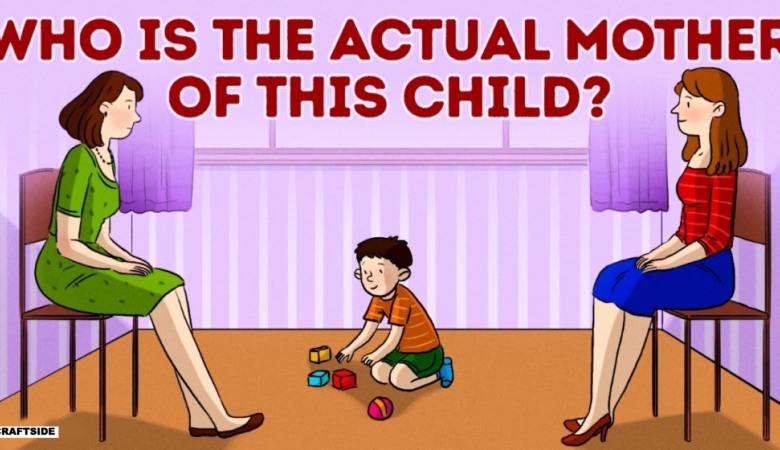





Leave a Reply